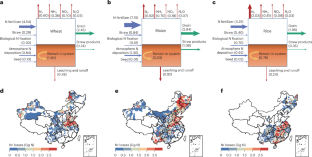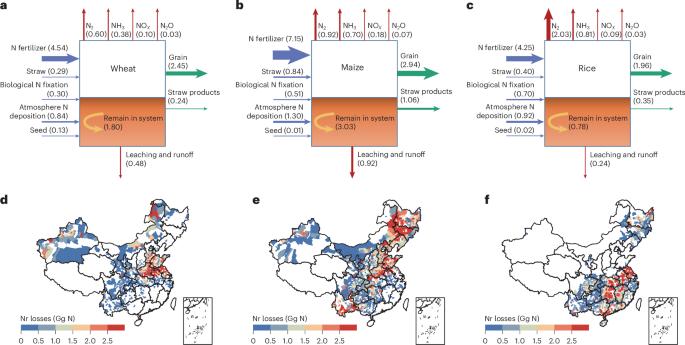Localized nitrogen management strategies can halve fertilizer use in Chinese staple crop production
IF 23.6
Q1 FOOD SCIENCE & TECHNOLOGY
引用次数: 0
Abstract
Nitrogen (N) management is the key to achieving food security and environmental sustainability. Here we analyse N flows using a localized N management model for wheat, maize and rice in 1,690 Chinese counties, with a breakdown of multiple reactive N (Nr) loss pathways. Results show that the total N input for producing these three staple crops in China was 22.2 Tg N in 2015, of which 7.4 Tg N was harvested as grain N and 4.0 Tg N was Nr losses in the forms of NH3 (47%), NOx (10%), N2O (3%), and leaching and runoff (40%). By assuming a production level equivalent to that of the top 10% of counties with the highest N use efficiency and yields surpassing the regional average, we reveal the possibility of achieving national staple crop production targets while improving net ecosystem economic benefit in 2050 through a 49% reduction (10.4 Tg N) in synthetic N fertilizer inputs and a 52% decrease (2.9 Tg N) in Nr losses. Staple crop production in China involves high levels of synthetic fertilizer use and losses to the environment. Using a localized nitrogen management model for wheat, maize and rice, this study estimates the environmental and economic benefits of improving nitrogen use efficiency at the county level.


因地制宜的氮肥管理策略可将中国主要作物生产的化肥用量减半
氮(N)管理是实现粮食安全和环境可持续发展的关键。在此,我们利用本地化氮管理模型,对中国 1690 个县的小麦、玉米和水稻的氮流进行了分析,并对多种活性氮(Nr)流失途径进行了细分。结果显示,2015 年中国生产这三种主要作物的总氮输入量为 22.2 万吨氮,其中 7.4 万吨氮以谷物氮的形式收获,4.0 万吨氮以 NH3(47%)、NOx(10%)、N2O(3%)以及淋溶和径流(40%)的形式流失。通过假定生产水平相当于氮利用效率最高的前 10%县的水平,且产量超过地区平均水平,我们揭示了在 2050 年通过减少 49% 的合成氮肥投入(10.4 千兆吨氮)和减少 52% 的氮损失(2.9 千兆吨氮)来实现国家主要作物生产目标,同时提高生态系统净经济效益的可能性。
本文章由计算机程序翻译,如有差异,请以英文原文为准。
求助全文
约1分钟内获得全文
求助全文

 求助内容:
求助内容: 应助结果提醒方式:
应助结果提醒方式:


